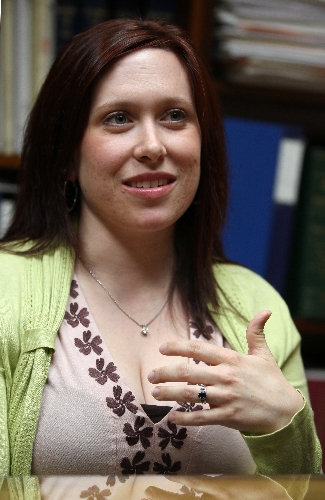Assault victim lobbies for campus gun measure

RENO — Amanda Collins doesn’t know whether she could have used her handgun to stop the man who sexually assaulted her in a University of Nevada, Reno parking garage. She never got the opportunity to find out.
Collins, then 22, was assaulted at gunpoint by James Biela the night of Oct. 22, 2007, after a midterm exam.
Three months later, Biela kidnapped and killed another student, Brianna Denison. He was sentenced to death last year, with sentences for attacking Collins and a third woman.
Collins is expected to testify before legislators today in favor of Senate Bill 231.
The bill, introduced by Sen. John Lee, D-North Las Vegas, would eliminate a requirement that people with concealed-weapons permits get permission from a college or university president to take their gun onto Nevada System of Higher Education property.
The restrictions stopped Collins from carrying one of two small handguns she is licensed to carry .
"I wasn’t given the chance to know how it could be different if I had been carrying," said Collins, now 25, who — in advocating for the bill — chose to forgo the anonymity she maintained while testifying against Biela.
"If I can prevent anybody else from suffering what I wouldn’t wish on my worst enemy, then it is worth forfeiting my anonymity," she said.
"I have spent many sleepless nights replaying the event in my mind over and over again with possible different opportunities and times that I could have been able to stop him."
After the attack, Collins said, she was terrified to return to campus. Her grades suffered, she lost her Millennium Scholarship, and her graduation was delayed.
She also said the attack, which came shortly before she got engaged, sapped the bliss from her wedding planning and contributed to two miscarriages.
"There were a lot of times when I contemplated never going back to campus just because it was the place of the attack so it brought up all the memories," Collins said. "I think it is something that only other rape victims can understand."
Others, however, say gun restrictions make Nevada’s campuses safer.
Jose Elique, police chief at the University of Nevada, Las Vegas, said students would put themselves in greater danger by carrying weapons on campus, especially in a mass shooting like the one at Virginia Tech in 2007.
Elique said police are trained to respond to mass shootings by quickly seeking the shooter and stopping him or her.
The presence of people with legal guns would only add to the chaos and increase the likelihood police would shoot an innocent person, Elique said.
"Our officers would in a matter of seconds have to make a split-second decision on whether to shoot them," said Elique, who plans to testify against the bill. "That particular second may be fatal to them."
Elique also said concealed weapons could make large gatherings during which alcohol is served more dangerous.
He cited the annual games between University of Nevada Las Vegas and University of Nevada, Reno as examples of events that already include alcohol-induced violence.
"I shudder to think what would have happened if everyone who went to that game was authorized to carry a weapon," Elique said.
Other critics contend there are better ways for lawmakers to increase campus safety.
They say the push in Nevada and elsewhere — the Idaho House of Representatives passed a similar measure this week — is being driven by groups such as the National Rifle Association that seek broader access to guns.
"They are not about campus safety, they are about an ideological agenda that doesn’t make sense on college campuses," said John Woods of Students for Gun Free Schools in Texas.
Woods, a Virginia Tech student at the time of the mass shooting, said that if lawmakers across the country were interested in campus safety, they would increase access to mental health services and do more to ensure mentally ill people cannot obtain guns, not encourage students to carry weapons.
"One thing that we learned early on is that if you have a weapon, it can be used against you," Woods said.
Supporters of the bill counter that people who meet state requirements to carry a weapon and complete the training should not have to go through college administrators to exercise their right to self-defense.
Washoe County District Attorney Richard Gammick, whose office prosecuted Biela, said he is in favor of legitimate permit holders making their own self-defense decisions.
"We are in a society now that thinks they are owed everything; one of the things they think they are owed is a risk-free life," Gammick said. "People need to get a little more self-reliant."
Since Lee introduced the bill, it has attracted about two dozen sponsors and co-sponsors from both parties.
Gov. Brian Sandoval hasn’t said whether he would sign the bill if passed.
Collins said the political fight will be worth it if the bill passes and the campus restrictions are lifted.
Only after the assault was she granted permission to take a gun on campus, and she said the permission was conditional on her being a full-time student and not telling anyone.
Collins said the fact she was raped at gunpoint in what was supposed to be a gun-free area supports her argument that the current policy is flawed.
"Despite their best efforts, what they are doing now is failing miserably," she said of the colleges. "So something needs to change."
Contact reporter Benjamin Spillman at bspillman@reviewjournal.com or 702-477-3861.